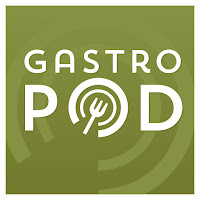Assigning a genre to podcasts is an exercise fraught with all kinds of hidden dangers, trap doors, and booby traps. There are podcasts that either defy classification or, more often, have one foot in one genre and another firmly planted in another genre.
Gastropod, for example, is a podcast that is equal parts about food and history. The podcast seamlessly infuses each episode with a pinch of historical perspective and a smidge of foodie nerdiness.
In other words, the podcast makes you hungry for more.
Gastropod defines itself as a podcast about the science and history of food. It has aired since 2014 and is hosted by journalists Nicola Twilley and Cynthia Graber. With the incessant drumbeat of consolidation in the podcast industry, it is refreshing that Gastropod is an independent podcast produced and hosted by Twilley and Graber, who interview chefs, scientists, and historians to collect stories about the science and history of food.
Amazingly, the two hosts produce the podcast out of their homes in Somerville, Massachusetts and Los Angeles, California, respectively. The podcast has grabbed its share of recognition by winning the The 2015 International Association of Culinary Professionals award for Best Culinary Audio Series (for the episode "The Golden Spoon"), Regional 2015 Edward R. Murrow Award for Best Small Online News Organization Audio Documentary (for the episode "The Microbe Revolution"), and, more recently, the 2019 International Association of Culinary Professionals award for Best Podcast or Radio Show.
Some of their best episodes include Menu Mind Control from November 2019 where Twilley and Graber talked to Alison Pearlman, author of a book on menus called May We Suggest. In the interview, Pearlman stressed how a menu has to persuade diners that they want what the restaurant is selling. So how do menus do that—and are they somehow subconsciously manipulating our choices? Are there universal principles of effective menu design that savvy diners can identify and outsmart? In this episode, the hosts deftly decode the history and science of the not-so-humble menu.
In August 2020, Gastropod released the episode What The Shell? Cracking The Lobster's Mysteries. In it, the hosts take us on a journey in which the lobster began as prison food to today where's it's an expensive indulgence. Then the hosts explain how the intricate mechanism that is the lobster eye would become a template for scientists to build a telescope. High on the gross-out scale is the explanation that lobsters urinate through their face while listeners learn that lobsters don't back down from other sea creatures and are very eager to mix it up with real or perceived enemies. Then, Twilley and Graber go through a particularly detailed explanation of lobster sex where the female squirts urine into the den of a desired mate, who invites her in for several days of intertwined antennae and claws.
Moreover, the hosts do not shy away from controversy. Witness the March 2020 episode White Vs Wheat: The Food Fight Of The Centuries. In the episode, the hosts enter the fray between white bread boosters and the wheat advocates. Along the way, they review 1920s claims that white bread breeds criminals and the central role played by Wonder Bread.
 |
| Gastropod co-hosts Cynthia Graber and Nicola Twilley |
Why is Gastropod such a critical and listener favorite? First and foremost, Graber and Twilley are terrific hosts who play off each other so effortlessly and have the timing of a well-oiled team.
Whether they are discussing how Leonardo da Vinci invented the first pasta machine, how Jack Daniel learned how to make whiskey, or the history of birthday cake, Graber and Twilley infuse a passion for discovery, a constant search for insight from facts, and a strong desire to inform into every episode.
Each episode, which is about fifty minutes long and is released every two weeks, delves deeply into details about the historical, cultural, and scientific background of the episode's subject and feature interviews with multiple experts, sometimes recorded on location at laboratories, farm fields, or archaeological digs. This attention to detail and for on-site reporting (which costs money and time) demonstrates their commitment to scrupulously researched and carefully curated episodes.
Gastropod does use Patreon for its hierarchy of fans who donate -- from Fans to Supreme Fans. Hosts Graber and Twilley again prove that independent podcasts can thrive and compete going up against Spotify, Amazon, and other podcast 'Big Shots."
Listen here to Gastropod.
by
Frank Racioppi

Comments
Post a Comment
Thank You for your input and feedback. If you requested a response, we will do so as soon as possible.